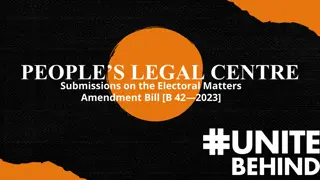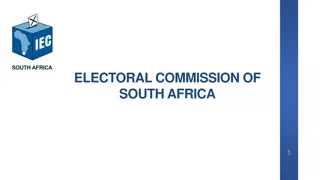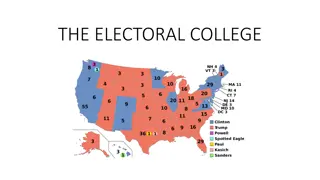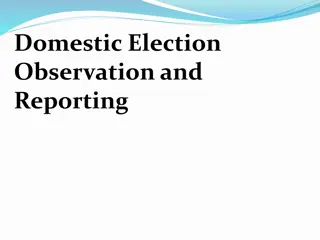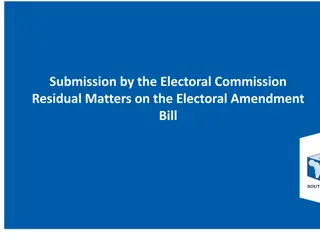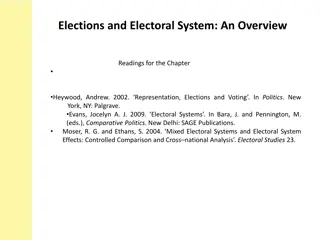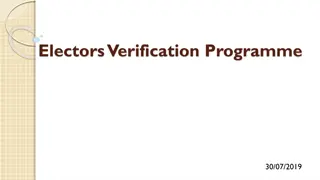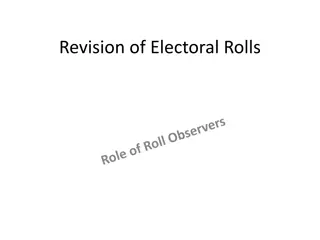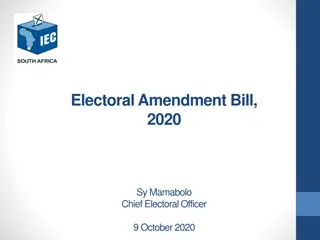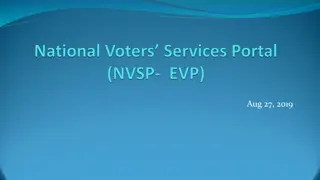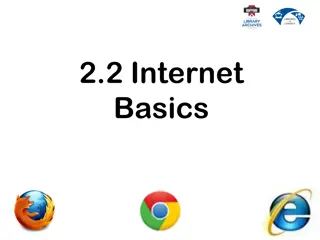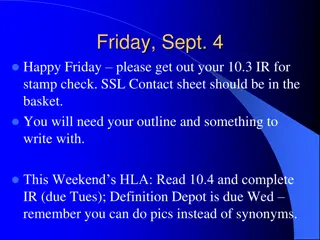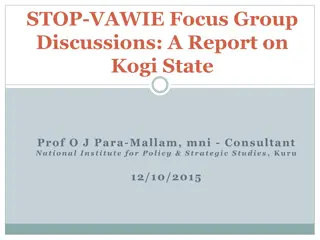Enhancing Data Security and Internet of Things in e-Electoral Process
Exploring the importance of data security and Internet of Things in the e-electoral process, this presentation delves into re-engineering the national electoral processes through hi-tech e-voting systems. It outlines the Nigerian electoral process, security issues, recommendations, and a review of the electoral history from 1999 to 2015. The presentation emphasizes the need for secure and technologically advanced voting systems to ensure fair and transparent elections.
Download Presentation

Please find below an Image/Link to download the presentation.
The content on the website is provided AS IS for your information and personal use only. It may not be sold, licensed, or shared on other websites without obtaining consent from the author.If you encounter any issues during the download, it is possible that the publisher has removed the file from their server.
You are allowed to download the files provided on this website for personal or commercial use, subject to the condition that they are used lawfully. All files are the property of their respective owners.
The content on the website is provided AS IS for your information and personal use only. It may not be sold, licensed, or shared on other websites without obtaining consent from the author.
E N D
Presentation Transcript
Data Security and Internet of Things in e-Electoral Process Prof. SB Junaidu Director, Institute of Computing & ICT Ahmadu Bello University, Zaria, Nigeria November 17, 2015
Outline Introduction Nigerian Electoral Process: A Post-mortem Process Re-engineering Hi-Tech e-Voting Systems Security Issues Recommendations Summary 1. 2. 3. 4. 5. 6. 7. e-Nigeria 2015@International Conference Center, Abuja November 17, 2015 2
Introduction: Theme: Re-engineering national electoral processes through the adoption of hi-tech e-voting system e-Nigeria 2015@International Conference Center, Abuja November 17, 2015 3
Introduction: The Electoral Process Relates to the entire cycle ranging from the provision of voter education to the dissolution of the National Assembly Refers to all the activities and procedures involved in the election of representatives by the electorates Refers to all the pre and post election activities without which an election is meaningless. e-Nigeria 2015@International Conference Center, Abuja November 17, 2015 4
Introduction: The Electoral Process According to INEC (2006) the electoral process includes: Delimitation of electoral constituencies Registration of voters Notice of elections Nomination of candidates Election campaigns Elections, announcement of results and completing tribunal sittings Participation of other organizations Resolution of electoral conflicts 1. 2. 3. 4. 5. 6. 7. 8. e-Nigeria 2015@International Conference Center, Abuja November 17, 2015 5
The Nigerian Electoral Process 1999-2015: A Quick Review Based on Osita Agbu s Unbridled Election Rigging and the Use of Technology e-Nigeria 2015@International Conference Center, Abuja November 17, 2015 6
The Nigerian Electoral Process From 1999, Nigeria conducted five elections: 1999, 2003, 2007, 2011 and 2015 Nigeria s electoral history had been characterized by grave incidences of electoral rigging beginning from the First Republic NDI (2003) report on 2003 election mentioned 12 states where fraud and irregularities were rampant and concluded that the minimum standard for democratic elections were not met e-Nigeria 2015@International Conference Center, Abuja November 17, 2015 7
Nigerias 2007 Election Marred with Irregularities (TMG, 2007): late arrival of materials and officials, stealing of ballot papers, vote buying, harassment, chanting, shooting and taunting of voters, lack of secrecy of voting, police interference, ballot snatching and stuffing, intimidation and political violence, denied access to polling stations, partiality of electoral officials and the police, improper voting procedures, late commencement of elections, and underage voting e-Nigeria 2015@International Conference Center, Abuja November 17, 2015 8
Nigerias 2007 Election The TMG concludes: the whole (2007) election was a charade and did not meet the minimum standards required for democratic elections. e-Nigeria 2015@International Conference Center, Abuja November 17, 2015 9
Nigerias 2011 Election According to (Idowu-Fearon, 2014), led to Unfortunate and unnecessary deaths of 943 persons, with 838 injured in the aftermath of the 2011 Presidential election INEC introduced reform measures for credible elections Yielded appreciable results Implications for the 2015 elections e-Nigeria 2015@International Conference Center, Abuja November 17, 2015 10
INEC Reforms towards 2015 Election From the experiences of the 2011 elections, INEC began early to plan for the 2015 Three focal points of structure, policy and plan were articulated Introduced the Permanent Voter Cards (PVCs) and Smart Card Reader (SCR). The most novel and strategic measure taken made it extremely difficult to rig the elections e-Nigeria 2015@International Conference Center, Abuja November 17, 2015 11
Nigerias 2015 Elections Environment Highly charged, INEC under scrutiny and alleged to be compromised in favor of the ruling party Nigeria was on the front burner of global attention Kofi Anan and Anyaoku s move to douse tension Visit to Nigeria by prominent ex-Presidents in Africa to lend their voice for peaceful elections John Kerry s visit to Nigeria soliciting for peaceful elections e-Nigeria 2015@International Conference Center, Abuja November 17, 2015 12
2015 Elections: The Triumph of Technology Use of Social Media (INEC, Parties, etc.) Information dissemination & feedback eTRAC Access to signed PU results from INEC web site AFIS Removal of multiple registrations Parties digitised and ICT compliant situation rooms tracking events especially on Election Day e-Nigeria 2015@International Conference Center, Abuja November 17, 2015 13
2015 Elections: The Triumph of Technology PVC and SCR made it extremely difficult for results to be manipulated PVC and SCR ensured free, fair and credible polls in 2015. The card readers and PVCs won us the elections, Kayode Fayemi I think the card reader and the PVC have helped deepen democracy in Nigeria, Nasir el-Rufai e-Nigeria 2015@International Conference Center, Abuja November 17, 2015 14
Are We Home, Yet? Key lessons learnt gains made in ensuring increased credibility for the electoral process Problems with use of technology disseminating unofficial and inaccurate results in violation of the provisions of the Electoral Act e-Nigeria 2015@International Conference Center, Abuja November 17, 2015 15
We Home, Yet? There were riggings in spite of the use of the PVC and SCR technology under-aged voters with PVCs over-counting, double voting, cancellations, and hijack of ballot papers e-Nigeria 2015@International Conference Center, Abuja November 17, 2015 16
Process Re-Engineering Many aspects of the electoral process can benefit from technology E.g., boundary delimitation GIS Point and Click boundary delimitation systems Focus, briefly, on technologies for e-voting e-Nigeria 2015@International Conference Center, Abuja November 17, 2015 17
Process Re-Engineering: Voting Key steps of the voting sub-process voter identification and authentication voting and recording of votes cast vote counting publication of election results e-Nigeria 2015@International Conference Center, Abuja November 17, 2015 18
Voter Identification & Authentication Required during Voter registration to establish right to vote Voting to allow voters exercise right to vote Done manually in most countries Some countries (including Nigeria) use technologies smart cards database management systems biometric information e-Nigeria 2015@International Conference Center, Abuja November 17, 2015 19
Voting & Vote Recording Requirements of a credible and reliable voting procedure Secrecy (all cast votes unknown until election ends) Anonymity (avoiding collusion, coercion) Fairness (one voter one value) Accuracy (in voter identification and votes counting) Transparency e-Nigeria 2015@International Conference Center, Abuja November 17, 2015 20
Voting & Vote Recording Two broad voting methods Printed ballot papers a. Believed to be the most accurate and most reliable for vote counting Electronic voting b. Provide high efficiency Capacity to deliver election results in a short time May lack log or paper trail on machine failure, suspicion of fraud, etc. e-Nigeria 2015@International Conference Center, Abuja November 17, 2015 21
E-Voting Systems A way to get people vote electronically Common types of e-voting systems Optical scanning systems Direct recording electronic systems (DRE) Internet Used on a large scale in Belgium, Brazil, India, Venezuela, the US and others e-Nigeria 2015@International Conference Center, Abuja November 17, 2015 22
E-Voting Systems: Optical Scanning Systems Voting done using machine-readable ballots Voter feeds card directly into a computer vote tabulating device or place the card in a ballot box The computer tabulating device identifies the marks made by voters on the cards and records votes accordingly e-Nigeria 2015@International Conference Center, Abuja November 17, 2015 23
E-Voting Systems: DREs Voters mark their votes directly into an electronic device, using a touch screen, push buttons or a similar device With DRE systems there is no need for paper ballots Use of DREs expanding in Belgium, Brazil, India and Venezuela Requires lots of voter education for use in Nigeria e-Nigeria 2015@International Conference Center, Abuja November 17, 2015 24
E-Voting Systems: Internet Voting Polling site Internet voting Ballots cast via Internet from clients machines physically situated in official polling places Both hardware and software of the client controlled by election officials Kiosk Internet voting client machines controlled by election officials but distributed in public places (e.g., shopping malls) Physical environment and voter authentication not directly under official control 1. 2. e-Nigeria 2015@International Conference Center, Abuja November 17, 2015 25
E-Voting Systems: Internet Voting 3. Remote Internet voting Neither client machines nor physical environment under control of election officials Though very attractive, presents serious intractable security risks e-Nigeria 2015@International Conference Center, Abuja November 17, 2015 26
Advantages of Internet Voting Internet voting can be used to improve the efficiency, effectiveness, and legitimacy of democratic elections The most important advantage to the voter is convenience Cost saving e-Nigeria 2015@International Conference Center, Abuja November 17, 2015 27
Security Issues With whatever new technology is on the table, security is always the big topic You have to be able to assure the public that it s a system that has integrity and security, and that folks will be comfortable utilizing it in every day practice Michael Winn, director of elections for Travis County, Texas e-Nigeria 2015@International Conference Center, Abuja November 17, 2015 28
Security Issues Internet voting is subject to inherent insecurity of The user s computer The network that connects to the central server Most home computers use a version of MS Windows A major goal of MS Windows is ease of use for novices not intended for highly sensitive mission critical apps Can be a fertile ground for viruses, worms, spyware or Trojan horse attacks Despite wide-spread use of firewalls and anti-virus software e-Nigeria 2015@International Conference Center, Abuja November 17, 2015 29
Security Issues Securing the connection between the voter s computer and the central server is also problematic Although use of public-key cryptography allows a degree of confidence in the integrity of the network Use same technologies for e-commerce and internet banking to prevent MitX attacks Other forms of attacks Denial of service Spoofing (e.g., phishing) e-Nigeria 2015@International Conference Center, Abuja November 17, 2015 30
Security Issues Guaranteeing security of internet voting more difficult than that of internet banking Despite widespread deployment of internet banking Unlike financial transactions, no connection may be desirable between voter and his vote Discovery of errors and anomalies in transmission or recording of votes cannot feasibly result in a correction of these results May lead to votes or even election invalidation e-Nigeria 2015@International Conference Center, Abuja November 17, 2015 31
Internet Voting Deployment No country has deployed a fully electronic voting system at the national level Hybrid systems (manual and electronic) offer a wide range of solutions, several of which have been used in a number of countries e-Nigeria 2015@International Conference Center, Abuja November 17, 2015 32
Internet Voting Deployment The State of Geneva in Switzerland beginning 2003 To support their peculiar frequent voting for direct democracy Parliamentary votes often subjected to ratification or refusal by the citizenry US Military experiment for use by overseas active- duty military personnel e-Nigeria 2015@International Conference Center, Abuja November 17, 2015 33
Internet Voting Deployment Full deployment of Internet voting is likely or even inevitable in the future For now, there are challenges Many crucial elements of the voting scheme completely outside control of election authorities e-Nigeria 2015@International Conference Center, Abuja November 17, 2015 34
Internet Voting Deployment For Nigeria, there are even more challenges Infrastructural issues Availability Ownership Technology issues Skills or competency issues Ownership e-Nigeria 2015@International Conference Center, Abuja November 17, 2015 35
Future Technologies: Internet of Things Environment where objects have unique IDs and can transfer data over a network without requiring human-to-human or human-to-computer interaction. IoT evolved from the convergence of wireless technologies micro-electromechanical systems the Internet. e-Nigeria 2015@International Conference Center, Abuja November 17, 2015 36
Recommendations Government should develop and deploy base ICT infrastructure Government should review laws guiding elections to address abuses ICTs NITDA should provide funding for developing indigenous voting technologies INEC should leverage tried-and-tested, ICT-driven standards for secure electoral data dissemination e-Nigeria 2015@International Conference Center, Abuja November 17, 2015 37
Summary Reviewed Nigerian electoral process Highlighted role of technology in the process Touched on importance of security in the process Surveyed hi-tech e-voting systems and their deployments Provided recommendations to support objectives of the summit e-Nigeria 2015@International Conference Center, Abuja November 17, 2015 38
References Osita Agbu (2015), Unbridled Election Rigging and the Use of Technology: The Smart Card Reader as the Joker in Nigeria s 2015 Presidential Election, Research and Studies Department, Nigerian Institute of International Affairs Eguavon Augustine Ainabor (2009), Problems of Elections and Imperatives of Reforms in Nigeria s Democratic Process , The Constitution, Vol.9, No.3, September. The National Democratic Institute (NDI)(2003), Election Special , The News Magazine, Vol.20, No.15. Jega Attahiru (2014), Electoral Reforms in Nigeria: Prospects and Challenges, INEC. INEC (2006): Building Confidence in the Electoral System Abuja: Independent National Electoral Commission. e-Nigeria 2015@International Conference Center, Abuja November 17, 2015 39
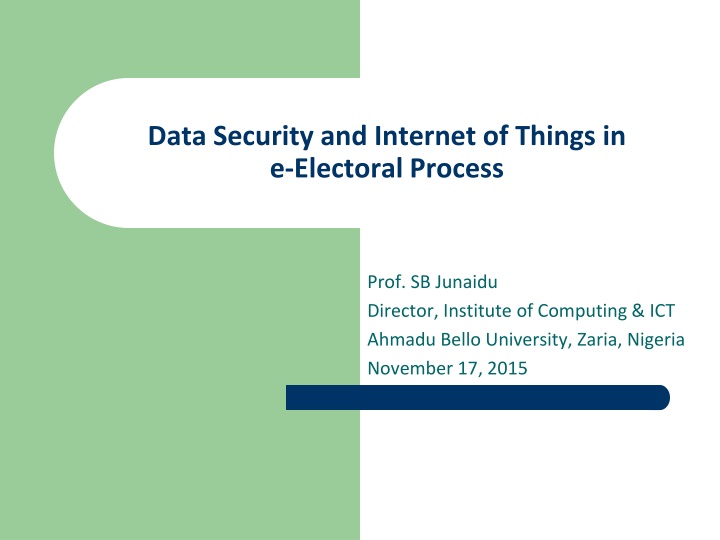

![RE: ELECTORAL MATTERS AMENDMENT BILL [ B42-2023]](/thumb/18837/re-electoral-matters-amendment-bill-b42-2023.jpg)

